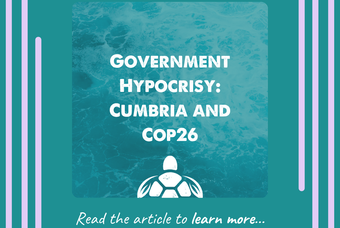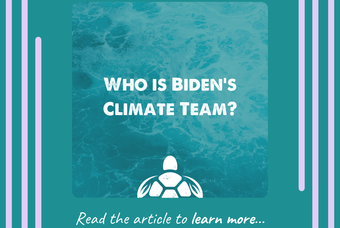The News-Hub/ Articles
Back to Articles
Recommended Articles
Who is Biden's Climate Team?
Trump’s presidency was one of the worst things that could have happened to America and the world in terms of the country’s role in addressing climate change. Prioritising economic growth over the environment, Trump relaxed and revoked many regulations that had been put in place by the Obama administration to reform the industries that do the most harm to the planet. The climate issue in America thus reached new heights, and the urgent need for Trump’s departure was very much demonstrated in this previous Purple Turtle article.
Joe Biden’s election represents renewed hope in the crisis. He intends to put right Trump’s wrongs by assembling an expert climate team that aims to reposition America as a global leader and front runner in the fight against global heating. Of course, this is a mission that could never have been accomplished with America absent from the Paris Climate Accord, so it is worth first examining the significance of America’s re-entry into the agreement under Biden.
What is the Paris Climate Agreement?
The Agreement is a commitment of 187 countries to keep rising global temperatures "well below" 2°C above pre-industrial levels. It is the world’s most influential climate change summit and the most significant climate legislative agreement of all time. Trump’s departure from the treaty in 2017 did much to tarnish America’s international reputation. After America’s withdrawal, many countries were forced to resort back to oil and gas to compete with US energy production. In the first days of his presidency, Joe Biden ordered the US to rejoin the Paris Climate Agreement, a move that renewed respect for the nation, and America’s new-found positivity will be of huge benefit to the rest of the world. The country’s success in leveraging its power on the global stage, however, is dependent on its ability to overturn the situation on the domestic stage. To accomplish this, Biden has outlined an ambitious climate policy.
What is Joe Biden’s Climate Policy?
The main aim of Biden’s climate policy will be to set in place regulations that see America achieve net zero emissions by 2050. By 2035, he hopes all electricity will be powered only by renewable and nuclear energy. He will embark on a ‘Clean Energy Revolution’ in which trillions are invested in clean energy infrastructure, with incentives and subsidies making clean energy the most profitable in the country. A Carbon Tax will be introduced, which will act as a deterrent to the use of fossil fuels. Stricter regulation of methane, a gas which is 50 times more heat trapping than carbon, is also expected after Trump completely halted the Government's monitoring of it. Biden has already issued executive orders to limit methane emissions from new oil and gas projects.
This will all take place alongside a ‘Green Recovery’ from Covid. Biden recognises that any economic recovery from the pandemic will inevitably be thwarted by an eventual economic collapse resulting from climate change. Thus, he intends to create millions of clean energy jobs to combine the effort of restoring the economy with reducing emissions. Linked with clean energy is his ambition to protect federal lands against harmful fracking projects, and to protect the diversity and endangered species within those lands. His goal is to conserve 30% of America's lands and waters by 2030.
The automobile industry is the most harmful industry in America in terms of pollution, contributing a little over a third of US greenhouse gases. Trump predictably rolled back an Obama-administration policy that enforced cars to be manufactured in more efficient ways. Biden will of course revert to Obama’s policies, but make them even stricter, given the worsening environmental situation over Trump’s tenure. He has also set a goal for all new trucks and cars to be electric by 2035, encouraging this through tax breaks and incentives for automakers. The signs are promising, with many automakers already changing their tunes given Biden’s election, and declaring their intention to start going electric.
Lastly, the negative effects of climate change most heavily affect those in poorer, more vulnerable communities, which often includes people of colour. It has in fact been found that people of colour are twice as likely to be exposed to air pollution. Therefore, there will be a strong focus on environmental justice and ensuring vulnerable communities are not disproportionately affected by pollution and climate change. Biden will look to invest more in communities of colour and ensure that solutions to environmental issues are developed through an inclusive, community-driven process.
What is the EPA in the USA?
To enforce the above-mentioned policies, America needs a strong domestic structure. The EPA, which stands for Environmental Protection Agency, is the principal agent in America for environmental protection. It is responsible for researching climate change, and for developing and enforcing regulations to combat it. There is no American agency more fundamental to reducing planet-warming emissions than the EPA. With Congress often deadlocked and partisan on the issue of climate change, enforcing regulations appears to be a task which may fall almost entirely on the EPA.
The agency, predictably, was hugely weakened by Trump, who massively deregulated it and appointed a series of climate sceptics and big business enthusiasts to positions of power within the agency. There is evidence to suggest that the EPA’s policies under Trump’s administration significantly increased greenhouse gas emissions, and could lead to thousands of extra deaths per year from poor air quality. Even in the final days of his presidency, Trump sought to make things difficult for the Biden administration in achieving its goals, by announcing an EPA rule that aimed to restrict the regulation of greenhouse gas emissions from all sources other than power plants. Biden immediately issued a memo ordering agencies to ‘halt, or delay, midnight regulations’ that had been made by Trump. This set the tone for the EPA’s quick recovery, as Biden hopes to see its power, integrity, and respect for science restored.
Biden’s Climate Team
Biden has appointed a host of highly respected climate experts in all of America’s top environmental agencies to deliver his climate policies. It's worth starting with the man he has appointed to lead the EPA.
Michael Regan - Environmental Protection Agency Administrator
The job falls upon Michael Regan, and he is the first black man to hold the position. Regan has worked for the EPA before, as an air quality specialist under both the Clinton and Bush administrations, but his most notable achievements have come from leading North Carolina’s Department of Environmental Quality. In this position, his work in accomplishing the largest coal-ash clean-up settlement in the country, and for ordering the chemical company Chemours to clean up toxic waste from the Cape Fear River, is widely praised. He was also instrumental in helping Governor Roy Cooper implement his pledge to achieve carbon neutrality in North Carolina by 2050 amid strong opposition.
However, Mr. Regan has also faced criticism for his time in this role, including from environmental justice groups who have accused him of not standing up enough to fossil fuel interests. In particular, he has been criticised for his approval of granting a water quality certification to the Atlantic Coast Pipeline, which would have carried natural gas across the Appalachian Trail. Nevertheless, he has received much praise from other environmental groups for giving poor and minority communities a larger voice in the state’s decision-making.
Crucially, Regan is also credited with restoring morale to the department after the previous leader of the department, Donald R. van der Vaart, a Trump ally, had questioned the science behind climate change and had fought Obama-era rules on limiting greenhouse gases from power plants. Many believe Regan’s role under Biden will draw parallels with this - he must lift the morale of an EPA department which has been much deflated by Trump’s administration. He intends to reaffirm the scientific values of the agency and will start by eliminating barriers that the Trump administration erected to make new rules difficult to enact. He will then expand Obama-era efforts to curb greenhouse gases from power plants, automobiles and oil and gas sites.
Gina McCarthy - White House National Climate Advisor
Biden has appointed Gina McCarthy as the first head of the new White House Office of Climate Policy. McCarthy’s role is similar to one which existed in the Obama administration; ‘Director of Climate Policy’. However, what makes this one a more powerful role than the Obama equivalent is that, for the first time, it is located within the White House itself. This means that climate change will now be an integral part of every major White House decision on national security and foreign policy. McCarthy’s job is to coordinate domestic climate policies across the United States government, thus playing a central role in helping President Biden to achieve carbon neutrality by 2050.
Before her role with Biden, McCarthy served as President of the Natural Resources Defence Council. However, she is most renowned for her work under President Obama, where she served as the EPA Administrator. In that role she was the architect of some of the most far-reaching greenhouse gas limiting regulations to date. She also played a key role in the development of the Clean Power Plan (later replaced by Trump’s more relaxed ‘Affordable Clean Energy Rule’). The CPP set the first ever national limit on carbon emissions from power plants, and worked hard to lessen the damaging effects of methane by limiting oil and gas leaks from wells.
Some have criticized McCarthy’s appointment, suggesting her polices against fossil fuel-dependant states are too stringent. During her time in the EPA, lawmakers from some states, especially Wyoming, accused her of stifling America’s economy in her efforts to build a healthy environment. Nonetheless, her forceful stance is respected by Biden, and his appointment of her is seen as a bold statement of intent with regards to his planned use of executive authority to bypass a partisan Congress.
Ali Zaidi - Deputy White House National Climate Advisor
Ali Zaidi will serve as Gina McCarthy’s deputy. Zaidi has an impressive track record. He was Associate Director for Natural Resources, Energy, and Science in the White House Office of Management and Budget under Obama, and contributed significantly to drafting the Obama-Biden administration’s climate change plan. He also played a role in helping to negotiate the Paris Climate Agreement. Before serving under Obama, Zaidi had served as the Deputy Secretary for Energy and Environment in New York State where he was a top energy policy aide for the governor of New York. He certainly has a lot of knowledge to contribute in terms of energy; as an adjunct professor at Stanford, he co-taught MATSCI 301: “Engineering Energy Policy Change”.
Zaidi argues that the economy is inextricably linked to climate change and that the crisis must be halted to avoid enormous expenditure for the tax payer in the future. He has emphasised an urgent need to create jobs that rely on clean energy for communities that have been negatively impacted by fossil fuels, and to rev up clean energy manufacturing and innovation to achieve this. He will therefore play a strong role in Biden’s ‘green recovery’ from the pandemic.
Deb Haaland - Secretary of the Interior
Deb Haaland has been chosen to lead the Department of the Interior. The Department is responsible for the protection of around 500 million acres of land and the natural resources and endangered species residing within it. Importantly, these lands often include oil and gas drilling sites, and Haaland will play an instrumental role in one of Mr. Biden's most controversial proposals: his pledge to ban all new hydraulic fracking on public lands. The former Interior Secretaries under the Trump administration opened up millions of acres of land to oil and gas drilling, as well as weakening protections on endangered species. Haaland was highly critical of Trump’s impact, and has said she will now step in to ensure, like Regan, that science will lead the department’s initiatives. Haaland has not been without criticism. Some groups that oppose action on climate change have called Ms. Haaland a “radical” on energy issues who ignores negative impacts that the pausing of oil and gas drilling could have on communities who may rely on it. This opposition highlights the challenge Haaland will inevitably face as Secretary.

The Department is also responsible for honouring the treaties with the Indigenous people from whom much federal land was once taken. Being of Indigenous origin herself, Haaland’s appointment is fitting, and marks the first time a Native American has led a cabinet level agency. This is seen by many as a ‘watershed moment’, because the Interior Department has for much of the nation’s history played a central role in the dislocation and abuse of Indigenous communities. Haaland will look to repair Indigenous relations that were strained further under Trump.
Haaland’s credible background in politics means she has much to offer the Biden Administration. In 2015, she was head of the New Mexico state Democratic Party and her powerful persona helped to flip the state to Democratic control. In 2018, she became one of two of the first Native American Women elected to Congress as a congressional representative for New Mexico. Two years prior to her selection as Interior Secretary, she served on the House Natural Resources Committee, an organisation which oversees the Interior Department- a case in point that she knows her new position very well.
Jennifer Granholm - Energy Secretary
Former governor of Michigan Jennifer Granholm has been selected to be Biden’s Energy Secretary. She will lead the Department of Energy, which oversees the United States nuclear weapons complex, 17 national laboratories and a wide range of energy research and development initiatives. Initiatives include the development of new energy technologies that could prove critical to slashing greenhouse gas emissions, such as advanced wind turbines or methods to capture carbon dioxide from industrial facilities before it reaches the atmosphere.
As governor of Michigan from 2003-2011, Jennifer Granholm is credited with working with the Obama administration to steer her state out of a recession in 2009. This included her overseeing the state’s heavy investment in electrical vehicle technology and worker retraining programmes to rescue an ailing auto industry that had long focused on gasoline-powered vehicles. She has used this accomplishment to allay concerns that a move toward cleaner energy sources would devastate the nation’s economy. After her second term as governor of Michigan ended in 2011, she became an advocate for renewable energy development, including giving a TED Talk on how investing in alternative energy resources can bolster state economies. This is an area Biden has focused on in his Covid economic recovery plan, and Grandholm’s knowledge in this area will be very useful to him. For the past decade she has argued that the Department of Energy should play a major role in spurring regional economic development. She is now at the helm of the department, and therefore has the perfect opportunity to accomplish this.
Brenda Mallory - Chair of the Council on Environmental Quality
Brenda Mallory chairs the Council on Environmental Quality which coordinates the federal environmental efforts and works closely with White House offices to develop green initiatives. Mallory is a long-time environmental lawyer who spent more than 15 years at the EPA, and this appointment marks her as the first Black woman to lead the council. The council typically plays more of a behind-the-scenes role in federal environmental policy than major agencies like the Interior or the EPA. However, following Mallory’s appointment, its standing is expected to be elevated by Biden because of her strong knowledge of environmental justice.
As well as her experience at the EPA, under the Obama administration Mallory served as the general counsel for the Council on Environmental Quality. Here she used her legal expertise to support Obama’s mission to protect public lands and lower carbon emissions. During Trump’s tenure, she fought hard to prevent him dismantling national monuments she had created with Obama. She later continued to gather experience in environmental policy, working as the executive director and senior counsel for the Conservation Litigation Project before joining the Southern Environmental Law Center. As well as using her legal expertise to add weight to the fight for environmental justice, Mallory’s tasks under Biden will include using the powers of the executive branch to undo the damage wrought by four years of EPA rollbacks and ending the Trump administration’s sell-off of public lands to the highest corporate bidder. Given her vast legal experience, Biden can be confident of success.
Will Biden Be Successful?
There is little doubt that Biden’s climate policy is well covered in the selections for his team. However, no matter who he has chosen, dissent is inevitable. Various industries will argue his policies will cost jobs, especially in the oil and coal industries, and prohibit economic growth. However, Biden stresses that this will be offset by the creation of employment in industries such as wind and solar manufacturing, and that he intends to fund the retraining of workers in these communities. Importantly, economists back his plan. They estimate that, if the Democrats sweep Congress, Biden’s overall economic plan will create 7.4 million more jobs than Trump’s based on his environmental campaign proposals.
The goal is permanent legislation that will outlast future administrations, whether Democrat or Republican. Passing such laws through Congress may prove difficult, particularly because of the divisive makeup of the Senate, which currently seems reluctant to pass sweeping environmental regulations. Does this mean Biden’s climate vision is impermanent? This depends on the next administration. If it is Republican, there could again be some rollbacks, especially if the next president is Trump again, or anything like him. However, with the steady transition of certain industries such as automobile makers into a greener economy, things are looking promising and rollbacks may not be so easy the next time. Nonetheless, no matter what may happen in the future, good or bad, there is one thing that is for certain. Biden has selected a very capable, experienced, and politically sound team to tackle climate change. America’s battle against global warming is in safe hands for now.
Got any thoughts on Biden’s climate policies? Are other governments around the world also making positive changes? Let us know in the comments below!
Empty content. Please select category to preview











0 comments. Write a comment